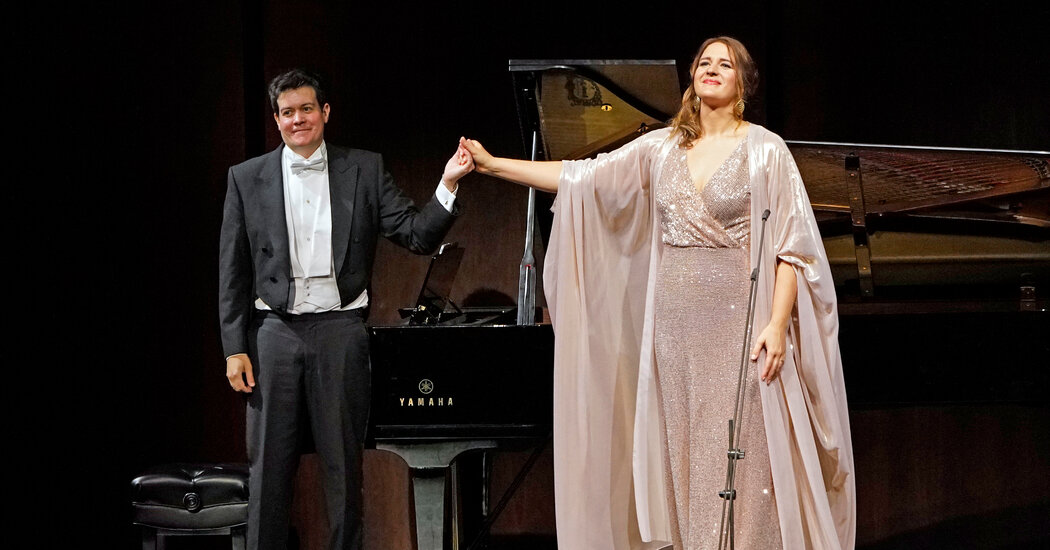
When Lise Davidsen sang the first four notes of Elisabeth’s aria “Dich, teure Halle,” from Wagner’s “Tannhäuser,” at the Metropolitan Opera last night, all I could think to write down in my notebook was “holy” — and remembering to mind my manners — “cow.”
That opening salvo was magnificent — an ideal balance of warmth, penetration and power that didn’t seem to strain her one bit.
It’s rare for the Met to invite an artist for a solo concert in its 3,800-seat auditorium. And it’s rarer still for that singer to be making her New York City recital debut.
But Davidsen is another rare thing: a true dramatic soprano. Originally trained as a mezzo, she possesses a fully resonant lower register that passes through a dark, capacious middle into a blazing, seraphic top. When her voice really starts flowing, its legato is molten, and the sonic boom of her high notes can cause a mild ringing in the ears. Davidsen’s timbre is also lovely in its shapeliness, metal wrapped in layers of velvet.
Her rangy program with the pianist James Baillieu covered improbable distances — Verdi’s delicate Desdemona from “Otello,” Wagner’s ecstatic Elisabeth and Tchaikovsky’s shattered Lisa from “Queen of Spades”; Schubert’s gracious songs and Richard Strauss’s rhapsodic ones; silver-age operetta and golden-age musical theater.
Rather than open the first half with Elisabeth’s rapturous greeting to the Hall of Song — too obvious — Davidsen chose three placid Edvard Grieg songs in her native Norwegian and three more in German. By the fifth song, “Zur Rosenzeit,” she was fully invested, adding a drop of ink to her pooling tone and bringing herself to the verge of tears amid the narrator’s grief-stricken desire. Baillieu also dodged expectations, exploring degrees of quiet from the Met’s vast stage.
Sensitive and theatrically engaged, Davidsen doesn’t merely ply audiences with lots of high-decibel singing. In the long introduction to Lisa’s suicide scene, she swayed back and forth, almost unconsciously, as her character waits impatiently for a lover on a riverbank, unfurling a splendid sound shot through with a chilly gust. No sets, no costumes, no orchestra: But the whole opera was there.
Using a microphone to talk to the audience between numbers, Davidsen, a witty, soft-spoken presence, explained the program’s personal bent. She wanted to bring her “home composer,” Grieg, to the Met stage; she had avoided Schubert for so long because she didn’t think dramatic voices were supposed to sing him; the “Queen of Spades” aria was a memento of her 2019 Met debut, and “Dich, teure Halle,” of her days as a voice student.
She needn’t have worried about Schubert. Her tone in “An die musik” and “Litanei auf das Fest Aller Seelen” was voluminous, clean and gently applied, and she made a compellingly operatic scene out of “Gretchen am Spinnrade.”
Perhaps there are times, though, when a voice is simply too big. The hushed, focused line of Strauss’s “Morgen” eluded her, and her tonal opacity, perfect for Wagner, sometimes obscured the vulnerability of an aria from Verdi’s “Un Ballo in Maschera.” But the arching exclamations of Strauss’s “Zueignung” and Sibelius’s “Den första kyssen” sounded tailor-made for her.
In a winking final set, Davidsen playfully enjoyed her own vocal glamour in an Emmerich Kalman operetta aria and slid languidly into Lerner and Loewe’s “I Could Have Danced All Night” in an apparent nod to the great Birgit Nilsson, who capped her famous recording of it with a missile-like high C.
Davidsen may have been acknowledging that audiences are eager for her to pick up Nilsson’s mantle. But she had also spent an evening inviting them to get to know her own story and artistry first.













